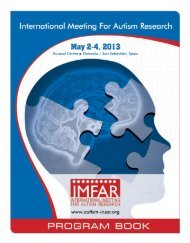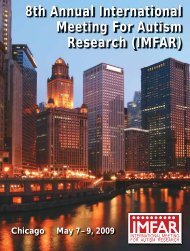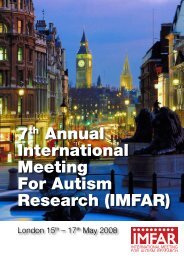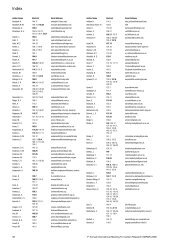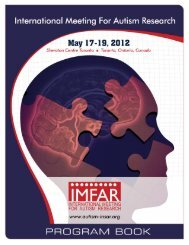9th Annual International Meeting For Autism Research ... - Confex
9th Annual International Meeting For Autism Research ... - Confex
9th Annual International Meeting For Autism Research ... - Confex
Create successful ePaper yourself
Turn your PDF publications into a flip-book with our unique Google optimized e-Paper software.
Program<br />
6:30-1:30P Registration (Registration Desk One Lvl 5)<br />
7:00-8:00A Coffee & Pastries (Grand Ballroom Pre-Function Area Lvl 5)<br />
8:00-8:15A<br />
8:15-9:15A<br />
Introduction: Simons Foundation (Grand Ballroom A-F Lvl 5)<br />
Keynote : Amanda Woodward: “Infants’ grasp of others’ intentions”<br />
Saturday May 22 – AM<br />
9:15-9:45A Break (Franklin Hall B Lvl 4 )<br />
9:45-11:45A IES: Medical Care of Children and Adolescents with ASD: Findings From the <strong>Autism</strong> Treatment Network (Grand Ballroom F Lvl 5)<br />
9:45-11:45A<br />
11:45-1:00P<br />
Oral Session: Brain Imaging 2 (Grand Ballroom<br />
ELvl 5)<br />
Lunch Break<br />
Oral Session: Neuropathology (Grand Ballroom<br />
AB Lvl 5)<br />
Oral Session: Comorbidities (Grand Ballroom<br />
CD Lvl 5)<br />
8:00-1:00P Posters<br />
& Exhibits<br />
(Franklin Hall B<br />
Lvl 4)<br />
Services,<br />
Human Genetics,<br />
Neurophysiology,<br />
Cognition &<br />
Epidemiology<br />
Keynote Address<br />
131 Infants’ Grasp of Others’ Intentions<br />
8:15 AM - 9:15 AM - Grand Ballroom A-F Level 5<br />
Speaker: A. Woodward; University of Maryland<br />
This talk will consider the early development of<br />
social perception in typically developing infants.<br />
The perception of others as intentional agents is<br />
fundamental to human experience and foundational<br />
to development. Recent research reveals that this<br />
cornerstone of social perception has its roots early in<br />
infancy, and that it draws structure from the universal,<br />
early emerging human experience of engaging in<br />
goal-directed action. Infants’ own action capabilities<br />
correlate with their emerging tendency to view others’<br />
actions as organized by goals. Moreover, interventions<br />
that facilitate new goal-directed actions alter infants’<br />
perception of those same actions in others. These<br />
effects seem to depend on the first-person aspects of<br />
infants’ experience. These findings open new questions<br />
about how doing leads to knowing in the social domain.<br />
Invited Educational Symposium<br />
132 Medical Care of Children and Adolescents<br />
with <strong>Autism</strong> Spectrum Disorders: Findings From<br />
the <strong>Autism</strong> Treatment Network<br />
9:45 AM - 11:45 AM - Grand Ballroom F Level 5<br />
Moderator: C. Lajonchere; <strong>Autism</strong> Genetic Resource Exchange/<br />
Cure <strong>Autism</strong> Now<br />
Knowledge of medical conditions that accompany<br />
ASD is limited. Recommendations for evaluation and<br />
management are often based on small case series and<br />
reports, and supporting data have not been consistent.<br />
Common medical problems include gastrointestinal<br />
symptoms, sleep problems, and seizures. The <strong>Autism</strong><br />
Treatment Network (ATN) was formed to advance<br />
understanding of medical comorbidities of ASD<br />
and to use this knowledge to shape best practices.<br />
This session will (1) describe common medical comorbidities<br />
seen in children and adolescents with<br />
ASD using data from the ATN patient registry of over<br />
1200 individuals, and (2) discuss approaches to<br />
treatment. Panelists will discuss methods of screening,<br />
evaluation, and treatment of gastrointestinal, sleep and<br />
EEG abnormalities; development of evidence-based<br />
guidelines for managing medical co-morbidities; and<br />
newly initiated research studies regarding the physical<br />
health of children and adolescents with ASD.<br />
9:45 132.001<br />
Introductory Remarks.<br />
10:00 132.002<br />
ASD and GI Co-morbidities: What do we know?. G. J. Fuchs*,<br />
University of Arkansas for Medical Sciences<br />
10:25 132.003<br />
Sleep disorders in ASD - Diagnosis and Treatment. B. A. Malow*,<br />
Vanderbilt University<br />
10:50 132.004<br />
EEG Abnormalities: Identifi cation and signifi cance. S. E. Swedo*,<br />
National Institute of Mental Health, National Institutes of Health<br />
11:15 132.005<br />
Next Steps: Clinical Guidelines and <strong>Research</strong> in Progress. D. L.<br />
Coury*, Nationwide Children’s Hospital<br />
Oral Sessions<br />
133 Brain Imaging 2<br />
9:45 AM - 11:45 AM - Grand Ballroom E Level 5<br />
9:45 133.001<br />
Growth Curves for Longitudinal Regional Brain Volumes in <strong>Autism</strong><br />
Vs. Typical Development. J. E. Lainhart* 1 , C. Ravichandran 2 , A.<br />
Froehlich 1 , M. B. DuBray 1 , T. Abildskov 3 , E. Bigler 1 , A. L. Alexander 4<br />
and N. Lange 5 , (1)University of Utah, (2)McLean Hospital/Harvard<br />
Medical School, (3)Brigham Young University, (4)University of<br />
Wisconsin, (5)Harvard University<br />
10:00 133.002<br />
An Examination of Brain Size in Infants at High Risk for <strong>Autism</strong>:<br />
Preliminary Findings From the Infant Brain Imaging Study. H. C.<br />
Hazlett* 1 , K. Botteron 2 , H. Gu 3 , R. McKinstry 4 , S. Paterson 5 , M.<br />
Styner 6 and J. Piven 3 , (1)University of NC, (2)Washington University,<br />
(3)University of North Carolina, (4)Washington University in St.<br />
Louis, (5)University of Pennsylvania and Children’s Hosptial of<br />
Philadelphia, (6)UNC<br />
10:15 133.003<br />
Subgroups of Abnormal Growth Trajectories: A Longitudinal<br />
Analysis of Amygdala Growth in Young Children with <strong>Autism</strong>. C. W.<br />
Nordahl*, R. C. Scholz, T. J. Simon, S. J. Rogers and D. G. Amaral,<br />
M.I.N.D. Institute, University of California at Davis<br />
56 <strong>9th</strong> <strong>Annual</strong> <strong>International</strong> <strong>Meeting</strong> <strong>For</strong> <strong>Autism</strong> <strong>Research</strong> (IMFAR) 2010



